My pick for year's top female track and field athlete is a GOAT
McLaughlin-Levrone tops herself and all-time lists despite running select few finals
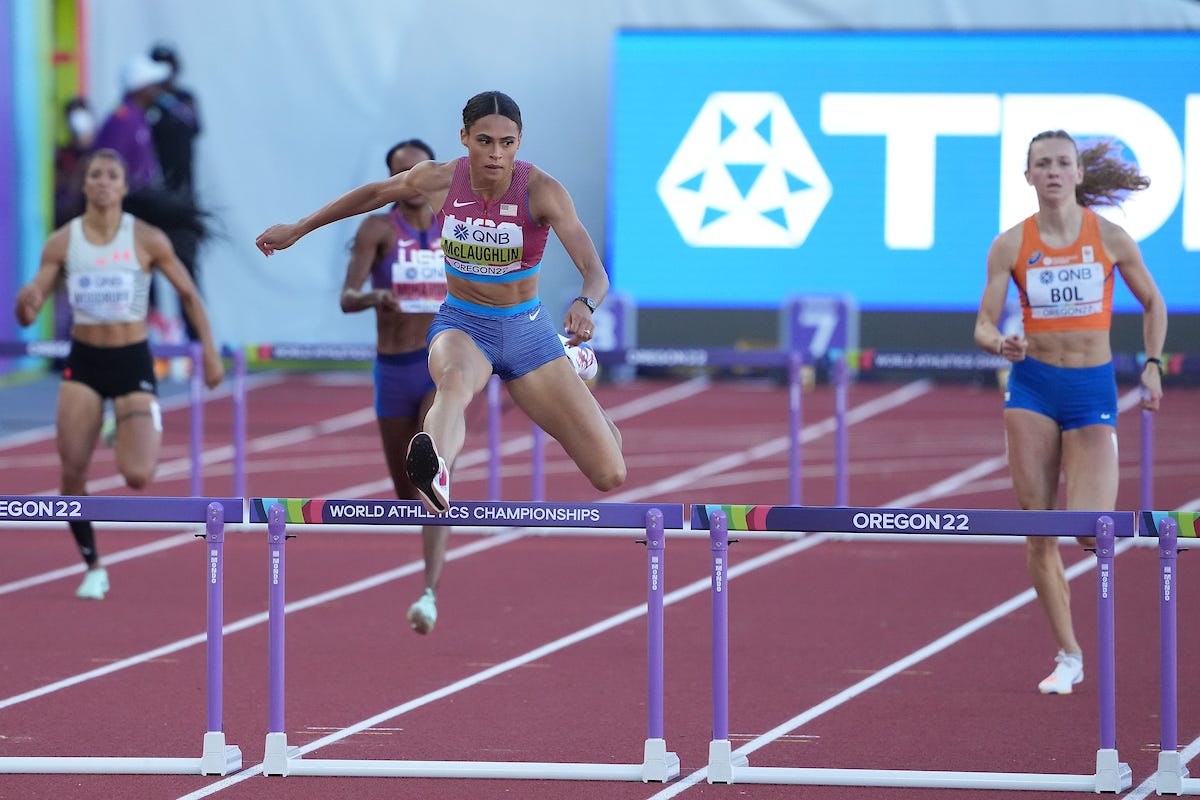
As someone who has been following the sport of track and field since the 1972 Olympic Games in Munich, I have to admit I would like to see Syndey McLaughlin-Levrone race more often.
But when it came time for me to choose a female athlete of the year for 2022, I did not hesitate to pick the greatest women’s 400-meter hurdler the world has ever seen.
While she only ran in four finals in the 400 hurdles during the year – a fact that led at least one internet site to contend she should not be considered for athlete of the year honors – her selection was a slam dunk in my book.
While two other women – Tobi Amusan and Yulimar Rojas – set world records during the year and another three – Shelly-Ann Fraser-Pryce, Sherika Jackson, and Faith Kipyegon – had particularly noteworthy seasons, none of them were as brilliant as McLaughlin-Levrone.
The American, who turned 23 in August, twice lowered her own world record during the year, with her second global best being a 50.68 clocking in the World Athletics Championships in Eugene, Oregon in July that made her the first woman in history to break 51 seconds in the event.
All told, she produced the first-, second-, fifth-, sixth-, and 10th-fastest times in history during the season. The average of those top five times is 51.51 seconds, a mark that no one other than McLaughlin-Levrone has ever run.
For good measure, she opened her season by running 12.75 to win the 100-meter hurdles in the Penn Relays at the end of April and ran a scintillating 47.91-second anchor leg on the U.S. team that was a runaway winner in the 1,600 relay in the World Championships.
“All of my goals were accomplished this year,” McLaughlin-Levrone told World Athletics in early December. “We were able to accomplish everything we set out to do. It couldn’t have been any better, and I was so grateful that I was able to produce that [50.68] performance in front of a home crowd.”
Big things were expected of McLaughlin-Levrone in 2022 after she had run world records of 51.90 and 51.46 in winning the U.S. Olympic Trials and Olympic Games, respectively, in 2021. But she exceeded those expectations when she ran 51.61 – then the third-fastest time in history – to win her first 400 hurdles race of the season in the Music City Track Carnival in Nashville, Tennessee in the first week of June.
That performance became more eye-popping when it was discovered that the sixth hurdles of the 10-barrier event had not been set up on the proper markings on the track, which caused McLaughlin-Levrone to stutter-step as she approached the sixth hurdle.
The fast time led to plenty of world record expectations when the USA Track & Field Outdoor Championships, the qualifying meet for the World Championships, were held in Eugene in late June.
McLaughlin-Levrone, who married Andre Levrone Jr. in May, did not disappoint. Her winning time of 51.41 trimmed five-hundredths of a second from the world record she set in the Olympics in Tokyo and left her more than a second and a half ahead of runner-up Britton Wilson, who ran a personal best of 53.08.
“I think there’s a little bit more in the tank there,” McLaughlin-Levrone said after the race. “Hopefully when it’s time we can empty it completely.”
She did that in the final of the World Championships three and a half weeks later.
After running 53.95 in her qualifying heat on July 19 and 52.17 – then the eighth-fastest time in history – in her semifinal the following day, McLaughlin-Levrone was in lane 5 as she settled into the starting blocks for the final on July 22.
Olympic bronze medalist Femke Bol of the Netherlands was inside of McLaughlin-Levrone in lane 4 with Olympic silver medalist and U.S. teammate Dalilah Muhammad outside of her in lane 6.
Those two were regarded as the biggest threats to McLaughlin-Levrone, but she never gave them a chance. She took the lead by the first hurdle and expanded it over the remainder of the race to the delight of a raucous crowd.
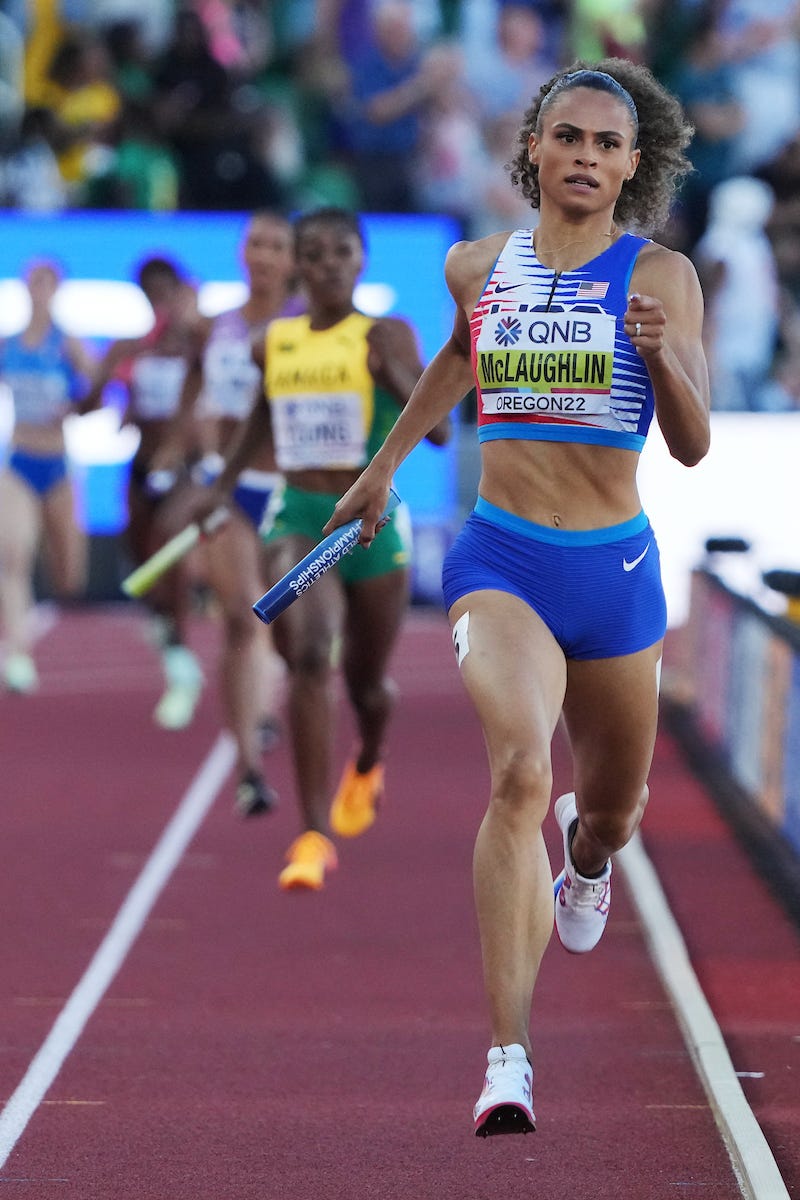
She was more than seven tenths of the second up on second-place Bol when she came through the first 200 meters in 24.25 and her advantage had grown to more than 1.2 seconds when she passed the 300-meter mark in 37.02.
McLaughlin’s winning time of 50.68 gave her a 1.59-second margin of victory over second-place Bol (52.27) and she was nearly 2½ seconds ahead of third-place Muhammad (53.13), who had run a then-world record of 52.16 to edge McLaughlin in the 2019 World Championships in Doha, Qatar.
Understandably exhausted after her history-making effort, it was three or four minutes before McLaughlin-Levrone, who was still seated on the track, felt up to engaging in a short trackside interview over the P.A. system.
When asked what she thought when she saw her time appear on the infield video display board after crossing the line, she said simply, “Unreal.”
Questioned further about her thoughts when she entered the home straightaway with such a large lead, she said she “just wanted to really go for it. Obviously that last 100 really hurt.”
Later on, after catching her breath, McLaughlin-Levrone told reporters that her sensational performance was far from a technical masterpiece.
“I think there’s always more room to improve upon,” she said. “There’s always more that can be shaved off for sure. There’s no such thing as a perfect race, but I don’t think that was a super-clean race.”
Two days after her victory in the 400 hurdles, McLaughlin Levrone teamed up with 19-year-old Talitha Diggs, 22-year-old Abby Steiner, and 21-year-old Wilson to win the 1,600 relay in 3 minutes 17.79 seconds, the eighth-fastest time in history.
She concluded her season 15 days later when she ran 51.68, the sixth-fastest time in history, to win the Istvan Memorial meet in Szekesfehervar, Hungary.
Although the European track and field season would run for another five weeks, it was not a surprise that McLaughlin-Levrone did not participate further. For if you look at her previous seasons, 2019 was the only one in which she was what I would call a semi-regular on the European circuit. And that might have been due to the fact that the World Championships were held in late September and early October due to the extremely high temperatures in Doha during the summer months.
McLaughlin-Levrone did not compete in 2020 when the first full year of the COVID-19 pandemic led to an abbreviated international track and field season held in stadiums with few, if any, people in attendance. And she only ran in three 400 hurdles finals last year after running the 100-meter hurdles in several meets early in the season.
She and her coach, Bobby Kersee, have talked publicly about her running the 400 in the upcoming year, saying they are eager to see how fast she can run in a one-lap race without having to contest 10 hurdles. But it is not known what her racing schedule will look like and if it will include more meets than in the last couple of years.
What is known is that McLaughlin-Levrone is a supremely gifted athlete who ran personal bests of 50.07 in the 400 and 22.39 in the 200 during her one collegiate season for the University of Kentucky in 2018.
Like Mondo Duplantis of Sweden in the pole vault, McLaughlin-Levrone set a slew of world age-group bests growing up, having run 55.63 in the 400 hurdles in 2014 when she was 14 before improving to 55.28 when she was 15, 54.15 when she was 16 – and a member of the U.S. Olympic team – and 53.82 when she was 17 and a recent high school graduate.
She was the No. 5-ranked 400 hurdler in the world by Track & Field News for 2018 after lowering her personal best to 52.75, and she moved up to second in 2019 after running 52.23 to finish a scant .07 seconds behind Muhammad’s world record in the World Championships.
“Both the flat 400 and the 400 hurdles are amazing options,” McLaughlin-Levrone told Track & Field News in early December. “There’s still much to be done in the 400 hurdles, but I haven’t run the 400 truly competitively since college, so there’s room for improvement there. A lot of it comes down to my coach and his decision, and he’s figuring out what to do. . . we’re looking at. . . what makes sense and what this year’s goals are. When we come to a decision, we’ll go for it all the way.”
The following individuals comprise my remaining top 10 female athletes for 2022:
2) Yulimar Rojas – The Venezuelen superstar produced the farthest jump in history when she bounded 15.74 meters (51 feet 7¾ inches) on her final attempt of the World indoor meet in Belgrade, Serbia in March and she registered the sixth-best mark with her winning jump of 15.47 (50-9¼) in the World outdoor meet in July. Undefeated in seven meets, she exceeded 15 meters (49-2½) in six of them while producing the top 10 jumps of the year.
3) Shericka Jackson – The Jamaican veteran had a breakout season as she won the 200 and placed second in the 100 in the World Championships. She had the three fastest times in the world in the 200, with her 21.45 clocking in the World Championships the second fastest performance in history behind American Florence Griffith-Joyner’s legendary 21.34 effort from the 1988 Olympic Games in Seoul. Jackson also posted times of 21.55 and 21.67, the fourth- and 13th-fastest times ever run. In the 100, she ran 10.71 to move to sixth on the all-time performer list.
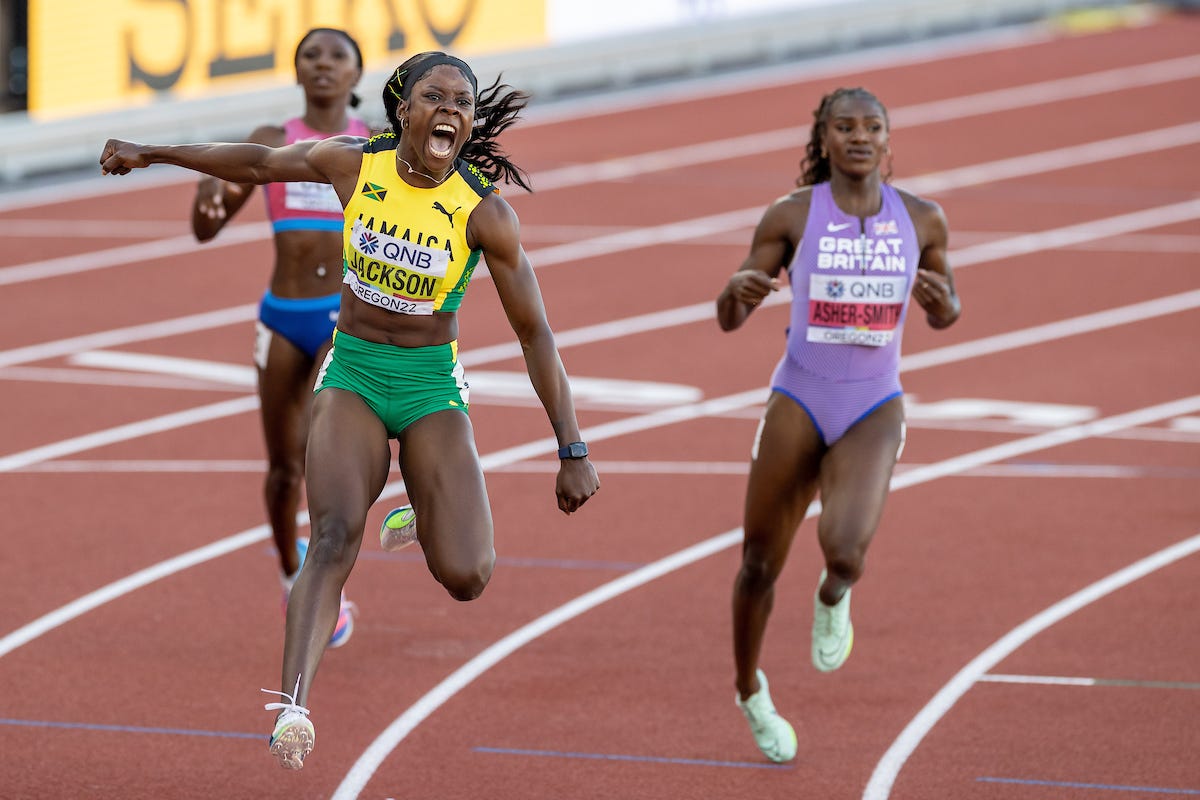
4) Faith Kipyegon – The Kenyan had the three fastest times of the year in the 1,500, with her 3:50.37 clocking in Monaco in August missing Ethiopian Genzebe Dibaba’s world record from 2015 by a scant three-tenths of a second. Undefeated in four finals, she also ran the 10th- and 11th-fastest times ever with her 3:52.59 and 3:52.96 performances in the Prefontaine Classic and World Championships, respectively.
5) Shelly-Ann Fraser-Pryce – The Jamaican sprint icon won the 100 and placed second in the 200 in the World Championships at the age of 35. The victory in the 100 gave her an unprecedented five World titles in the event in which she had the eight fastest times in the world this year, including an unprecedented seven sub-10.70 clockings. Her best of 10.62 was the second fastest of her career and tied for the sixth fastest in history. Her season best of 21.81 in the 200 came in the final of the World Championships and was the second fastest of her career.
6) Tobi Amusan – The Nigerian turned in the most stunning performance of the World Championships when she ran a world record of 12.12 in the 100-meter hurdles in the semifinals before winning the final in a wind-aided 12.06, the fastest time run under any conditions. Although she was beaten in five of her first seven meets of the season, she won 8 of her last 10 finals. Included in that stretch of victories was a 12.30 clocking in the Commonweath Games in Birmingham, England in August and a 12.29 effort in the Diamond League Finals in Zurich in September.
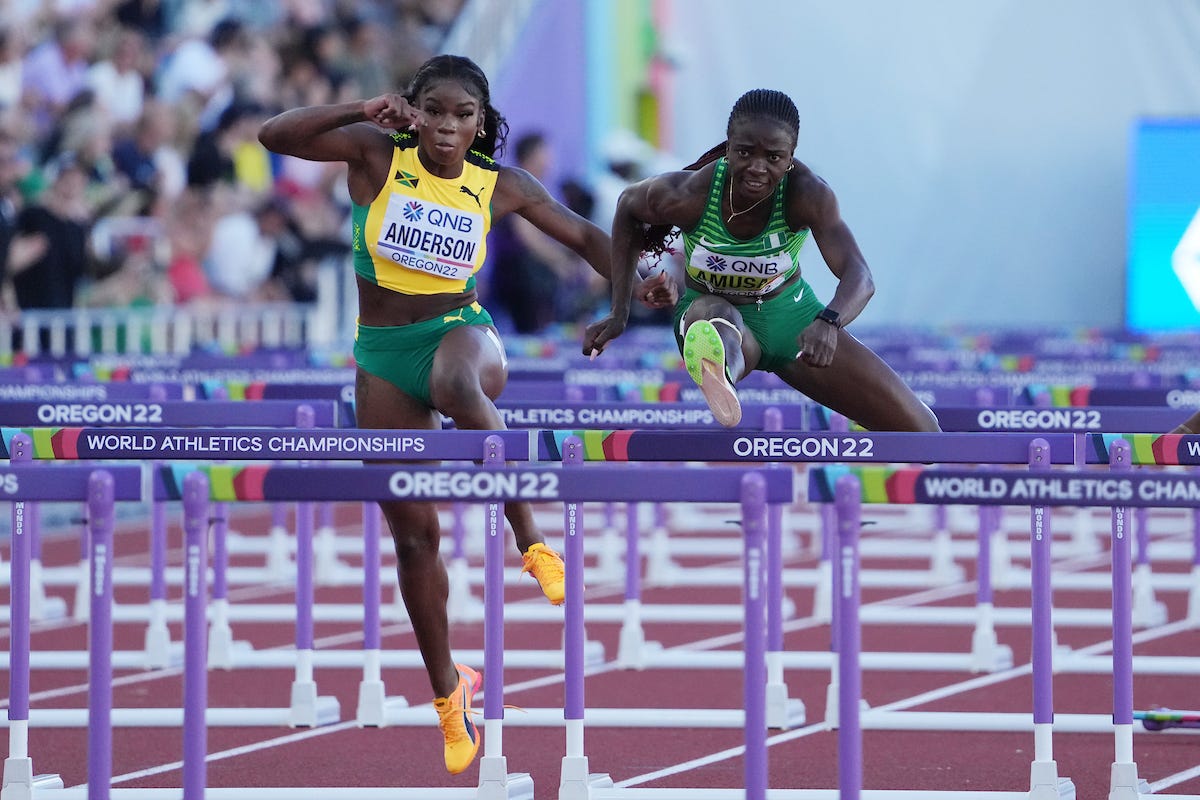
7) Norah Jeruto – The Kenyan-born Kazakhstani won the 3,000-meter steeplechase in the World Championships with an 8:53.02 clocking that was the third fastest in history and came four days after she had run 9:01.54 in her qualifying heat, the fastest non-final ever. Undefeated in four finals, she also ran 8:57.97 to win the Prefontaine Classic.
8) Brooke Andersen – The American won the World title with a 78.96 (259-1) effort that gave her a margin of victory of nearly three and a half meters. She was so dominant during the competition that her third-best throw of 77.42 (254-0) was nearly two meters further than the top mark of the silver medalist. The winner of eight of 10 meets, her best of 79.02 (259-3) topped the yearly world list and moved her to fourth on the all-time performer list.
9) Nafi Thiam – The Belgian won the World and European titles in the heptathlon. Her 6,947-point total in the World Championships was the best score in the world this year and the second best of her career. The two-time Olympic champion also won her second consecutive European title with a 6,628-point effort a month after the World Championships.
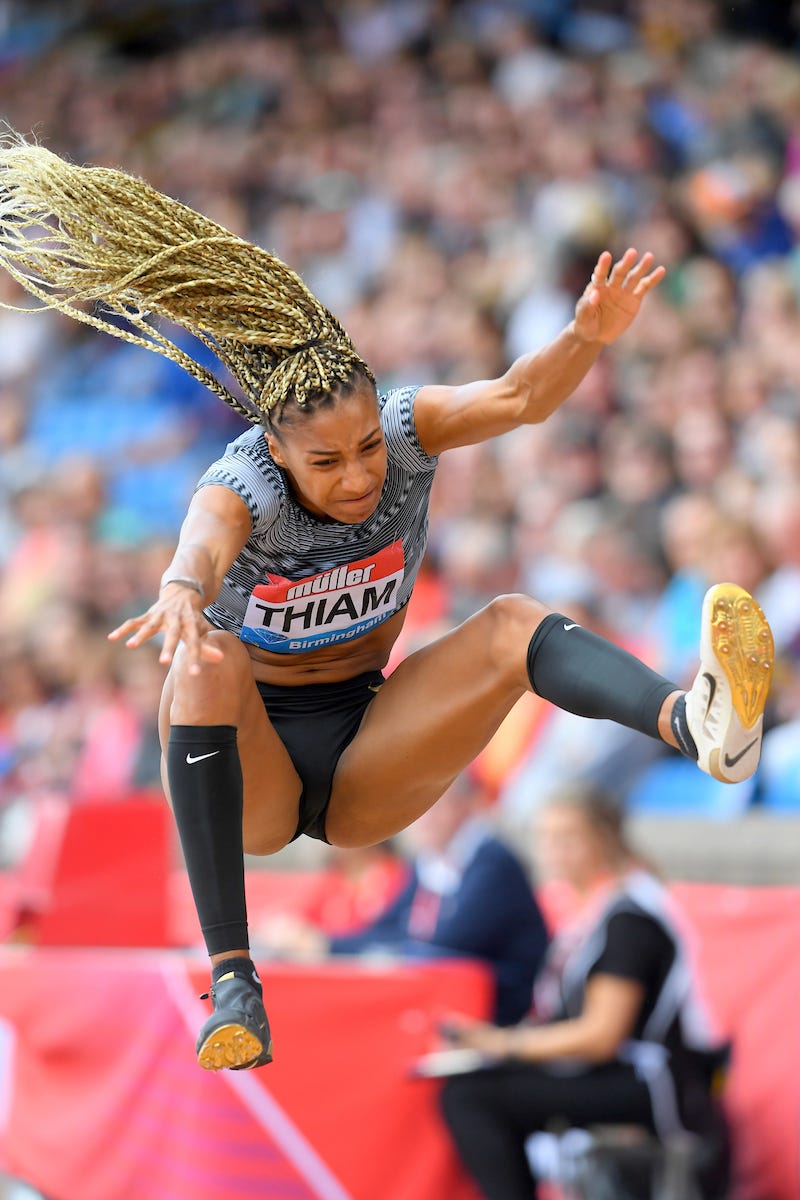
10) Athing Mu – The Olympic champion in the 800 displayed her competitive mettle in both the World Championships and USA Track & Field Outdoor Championships when she won those races by margins of eight- and seven-hundredths of a second after engaging in grueling homestretch duels. She won the global title meet in 1:56.30, the fastest time in the world this year, and also ran 1:57.01 in the Golden Gala meet in Rome and 1:57.16 in the national championships in Eugene.



